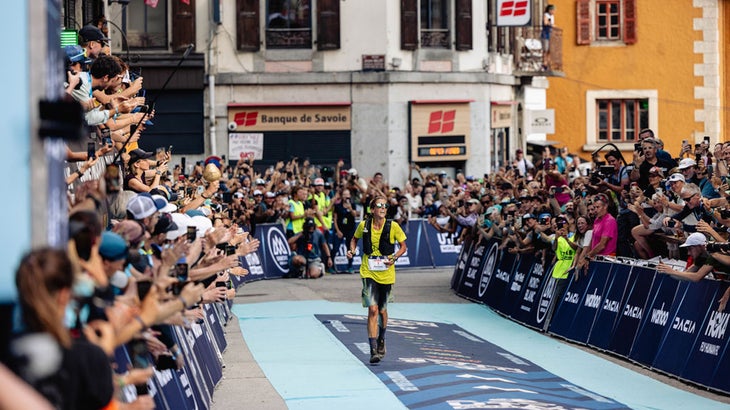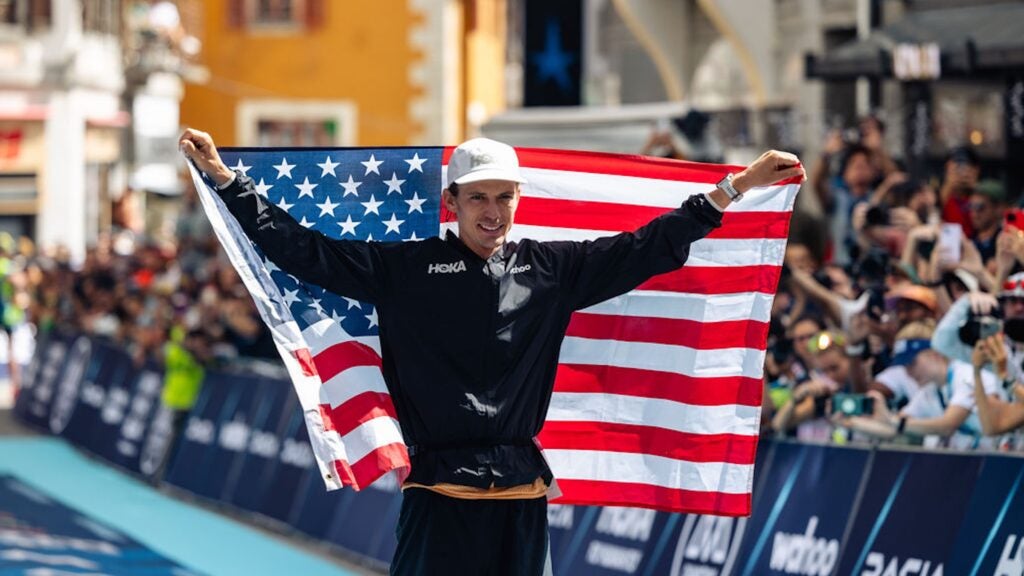No products in the cart.
Outdoor Adventure
Walmsley and Dauwalter Pull off American Sweep at UTMB in Chamonix
In what is certainly the pinnacle of the trail running world, Jim Walmsley and Courtney Dauwalter were each greeted by a riveting hero’s welcome from roaring spectators as they ran into the crowded pedestrian village of Chamonix, France, four hours apart on the afternoon of September 2.
Both were stunning moments that nearly drowned out the dramatic Ultra-Trail du Mont-Blanc’s (UTMB) theme song, Vangelis’s “Conquest of Paradise,” blasting through the sound system. And deservedly so, as both American runners turned in remarkable efforts to win the men’s and women’s races in the 20th edition of UTMB, the de facto world championship of ultra-distance trail running.
The legendary race began at 6 P.M. on September 1 and sent runners on an arduous 172K (106-mile) loop through parts of France, Italy, and Switzerland around the Mont Blanc massif. Although the course was slightly modified this year, it included 10 major climbs and descents and entailed nearly 33,000 feet of elevation gain during the circumnavigation of the highest peak in Western Europe.
Walmsley, a 33-year-old French transplant from Flagstaff, Arizona, became the first American man to win the race (19:37:43), while Dauwalter (23:29:14) won it for the third time in three tries since 2019 and, more emphatically, completed the unprecedented—and largely unfathomable—triple crown of winning the Western States 100, Hardrock 100, and UMTB in same year.
The race has received a lot more attention in recent years, especially with the formation of the UTMB World Series global qualifying circuit last year. During this year’s event, there were moments on the course that looked reminiscent of frenzied fans cheering on riders during the Tour de France.

“You Can’t Triple Unless You Try”
“The fans out on the course this year were incredible. Their energy was definitely propelling me forward,” said Dauwalter, a 38-year-old Salomon-sponsored runner from Leadville, Colorado. “It was really, really hard. The last half of it was really just about holding it together. My stomach was a little bit finicky. My head was mostly OK, but I kept wondering how I was going to get back (to Chamonix).”
Dauwalter’s victory is historic in its own right. But it’s nearly incomprehensible in the context of her summer. In late June, Dauwalter won the Western States 100 in Auburn, California, shattering the seemingly untouchable 11-year-old course record by more than 75 minutes, in 15:29:34.
She backed up that legendary performance just three weeks later with another course record at the grueling Hardrock 100—a race with 33,197 feet of elevation gain in and around Silverton, Colorado—while once again lowering the course record by an hour in a dominating victory (26:14:08). And by winning UTMB, Dauwalter, the undisputable queen of ultrarunning, completed her sweep of the sport’s most prestigious triple crown.
Dauwalter had already won each of those races twice by the time she arrived in Chamonix in early August, but becoming the first and only person to accomplish the hat trick in one summer, she catapulted herself into another realm. And she’s done it at a time when women’s ultrarunning has never been more popular or more competitive.
She took the lead early in the race and was never challenged, but she had to manage a finicky stomach for a while and was so fatigued from the summer of racing she seemingly had to turn herself inside out to reach the finish.
“You can’t triple unless you try,” Dauwalter said. “Any time we’re given the opportunity to try something difficult or crazy, we should absolutely take it. This was totally crazy and really, really difficult, but worth it.”
“Any time we’re given the opportunity to try something difficult or crazy, we should absolutely take it. This was totally crazy and really, really difficult, but worth it.”
While U.S. runners have had success since the inaugural UTMB race in 2003—Krissy Moehl was the first women’s winner and American runners Topher Gaylord and Brandon Sybrowsky tied for second—several U.S. women, but never an American man, found their way to the top step of the podium until Walmsley won this year. In addition to Moehl (who also won in 2009), Americans Nikki Kimball (2007), Rory Bosio (2013, 2014), Dauwalter (2019, 2021, 2023), and Katie Schide (2022) have all won the women’s UTMB race.
Walmsley, a three-time Western States 100 winner, set out to try to eradicate his own frustrations from four prior UTMB races. Although always one of the favorites whenever he’s been on the starting line, he’s had two good-but-not-great finishes (fifth in 2017, fourth in 2022) and two DNFs (2018, 2021).
He and his wife, Jess, moved to France in May 2022 so he could focus on training for the race, but it took several months to feel comfortable living overseas—partially because they overstayed their initial 90-day visa and had to struggle for a full year to get the rest of their paperwork completed. After his disappointing fourth-place finish at UTMB last year, he was able to immerse in French life and enhanced his training with ski mountaineering during the winter and long spring and summer days of running and hiking on the steep trails through the massive mountains of the Beaufortain Valley near their home in Arêches, about 50 miles southwest of Chamonix.
Combined with a revitalized nutrition strategy—that excluded candy and sugary junk food that he had been so accustomed to—he said he just felt fitter, better prepared, and more confident heading to the starting line this year. But he had moments where he struggled, too, especially after Zach Miller—a 34-year-old American runner who had three previous top-10 finishes in the race—took the lead and pushed the pace near the 60-mile mark of the race.
After taking in key nutrients and changing into a lighter and softer pair of Hoka prototype shoes at the 79-mile aid station in the Swiss ski town of Champex-Lac, Walmsley felt revitalized and ready to race hard again.
“He got up from the table and the energy totally shifted,” Jess said. “And as he was walking out, he looked back at me with a certain look. I know that face, it’s his race face. So it’s kind of like, ‘Game on! Let’s go!’ And, and then that’s what we saw after that.”
Walmsley caught and passed Miller about 90 minutes later and then quickly put a large, insurmountable gap on him, running the final 20 miles back to Chamonix unchallenged.
“That felt terrible for quite a while,” he said after the race. “Going into Champex was a low moment, for sure, but we got things taken care of. It’s all just kind of a synergy that just worked out this year and almost a bit of luck because it seems at times things were going south and I just feel lucky that it turned around.”
This year, Dauwalter was joined by compatriots Leah Yingling (eighth) and Sabrina Stanley (ninth) among the top 10, the second time U.S. women have had three top-ten finishers at UTMB.
On the men’s side, Miller held on to finish second (19:58:58), 22 minutes behind Walmsley and 12 minutes ahead of mid-race challenger Germain Grangier of France (20:10:52), while Tyler Green, 39, of Portland, Oregon, finished seventh (21:19:21) two months after finishing second at the Western States 100.
Many of the all-time great American men have run UMTB through the years—Scott Jurek, Anton Krupicka, Geoff Roes, Timmy Olson, Hal Koerner, Tim Twietmeyer, Tim Tollefson, Mike Wolfe, and Mike Foote, among others—but have come up just short or spectacularly short in their quest to win the race.
Walmsley immediately credited the strong legacy of American women in UTMB, even as Dauwalter was still en route back to Chamonix to win her third title.
“It just means I can add my name alongside the strong U.S. women’s contingent,” Walmsley said. “They’ve done it again and again here and I am just happy to stand on their shoulders.”
Source link

